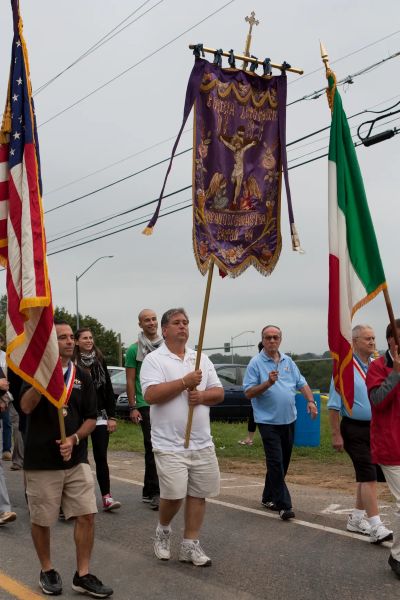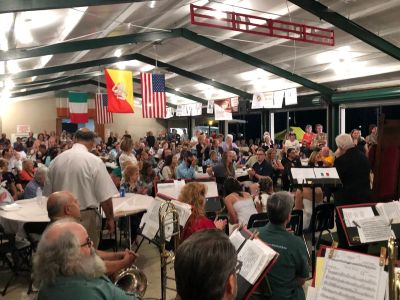Beginning in the late 19th and early 20th centuries, Italian immigrants with farming backgrounds began arriving in Iowa. However, most came without the money to purchase the necessary land. Instead, they found work in the coal mines of southern and central Iowa, or settled in areas such as Oelwein, Council Bluffs, and Des Moines, where they laid track for the state's railroads or worked on streetcars. After the mines closed, many workers moved to Des Moines and formed their own Little Italy.
In 1981, a small group of proud Italian immigrants founded the Italian-American Cultural Center of Iowa to build on the legacy of those original settlers. The 501(c) (3) organization aims to promote, preserve, and share Italian heritage and culture with the Des Moines metro area and the state of Iowa through a museum, events, and on-site amenities. Even this year, amid renovation and remodeling, the center remains a hub for everything from bocce and Italian language and genealogy classes to a St. Joseph's celebration and gala.
I spoke with Therese Riordan, the Italian-American Cultural Center of Iowa's Secretary of the Board of Governors and Chairperson of the Heritage Advisory Council, whose parents were among the founders. She's been with the organization for more than three decades, honoring her family's largely Calabrian heritage. Her mother, Patricia Civitate, the Center's former Director, remains an active member at 95.
Therese shared more about Des Moines' Italian ties and the organization's offerings, challenges, and goals.

Patricia Civitate speaks to a women's group about the significance of the St. Joseph's Altar and breads.
What most memorable events or initiatives has the Center hosted over the decades?
We hosted RAGBRAI from Veneto when they came over from Italy to ride on the Iowa bike tour. The Center also hosted receptions for visiting Italian sports teams and sometimes gave tours of the city. We also provided meals for people who toured our museum.
Our organization pursued a partnership between the Greater Des Moines Sister Cities and Provinci di Catanzaro in Southern Italy. We've hosted Italian chefs from various regions on three occasions. Folk dancers affiliated with us (although it's a separate organization) have hosted the Italian Folk Art Federation of America Conference in Des Moines twice. And we've sponsored numerous trips to tour Italy.
At our museum, we've had some nice, one-of-a-kind things come in. We have a large display of regional hats donated by a lady in New York. We also received puppets. Someone recently donated a hand-carved Italian Jesus made from Italian wood, and a story goes with that. Somebody even gave us a grand piano, and for me, that was exciting.

Day camp members learn about Venice.
Tell us about your children's day camp.
Children from ages six to 12 are invited to spend the week with us, and it's a themed week. This past year, we set an Italian table. They made a centerpiece and an appetizer, and they learned the Italian language around those things, watched videos, sang songs, and did some crafts.
Every day, they do a craft, learn the Italian language, cook, make music, and play a game. They have five days to put together an Italian meal, which they can take home.
We've done some fun stuff. I don't think we'll do volcanoes again. That year, we had 21 kids, which is an unusually large number. They made their own volcanoes after we studied the Italian volcanoes. We let them have them erupt, and it was very exciting, but it was very messy. That was a good time.

The children meet La Befana, Italy's beloved Epiphany witch.
Tell us about your other offerings.
The Iowa Genealogical Society of Iowa has generously allowed us space for our language classes. They have been approximately twice a year for the last three or four years. They have been fairly well attended, and people on their way to Italy are always anxious to take them. We're hoping to continue doing those.
We offer translation services for people who need them and have provided dual citizenship classes. We also have a lady who's extremely good with genealogy, so she's very welcoming and helpful whenever there's a question.
We hosted our St. Joseph altar celebration and Italian Father's Day in March, an activity we haven't been able to do recently because of COVID. It involves putting together a large center altar and then six or more side altars, and they all have to be decorated and laid out with memorabilia from the organization that sponsors it, plus fruits and vegetables. It used to be with a dinner, but we couldn't do that this year. But they did a beautiful job of decorating.

Members prepared veggie frittatas to donate to the Catholic Worker House as part of their annual St. Joseph Altar celebration.
Are there any upcoming events you're particularly excited about?
We will have our October heritage month—whatever we can do without being in the building. We will have a large fundraising dinner in November, which should be extremely nice. We haven't done this for a few years, but there's a new committee working on it, and it should be beautiful. It will feature a chef from Italy.
What are your challenges and goals?
The challenge in the capital campaign is always money. And everybody wants the same pot of money, so that's one of the things we're working for. Our plan is not just to be a place for Italians. Our plan is to be a place where we can share what being Italian means with everybody else. It's not a clubhouse. It's a place to learn about our background, our customs, and how they fit into the fabric of the United States and Iowa.

The Italian American Cultural Center of Iowa's mitten tree, a collection of donated hats, scarves, and mittens, is distributed to neighborhood centers.
What do you hope to share?
We hope that we'll be a place where people can come and share their stories and learn about Italy, the background of some of the people who came here, and their contributions to the state of Iowa and the United States. Unfortunately, one of the things that, if you say Italian, is the first thing people think of is the mafia. There is so much more than that. There are so many contributions that Italians have made to the world and the state of Iowa that we would like to highlight, and we'd like to give this an opening for people to come in and talk about themselves and their backgrounds.




